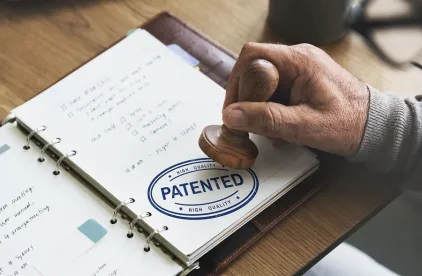In a recent case, Trimble Inc. v. PerDiemCo LLC, No. 2019-2164 (May 12, 2021), the Federal Circuit found that, sometimes, threatening a patent infringement action, or entering extensive patent license negotiations prior to filing suit, with a company having a presence in a particular state could subject you to jurisdiction in that state, even if you are located elsewhere.
On one hand, this could provide a retailer with the ability to obtain declaratory judgment jurisdiction in a preferred home forum when the retailer is on the receiving end of infringement threats from a patent owner. On the other hand, this means that retailers should be aware of their communications regarding their own patents, and take care not to inadvertently subject themselves to a suit by a target alleging non-infringement in an unwanted jurisdiction.
Background
Trimble and its wholly-owned subsidiary, Innovative Software Engineering (ISE), manufacture and sell GPS products and services, electronic logging devices, and geofencing products. Trimble is incorporated in Delaware and headquartered in Sunnyvale, California. ISE is headquartered and has a principal place of business in Coralville, Iowa.
In October 2018, Robert Babayi, the sole owner, officer, and employee of PerDiemCo, sent a cease and desist letter and unfiled patent infringement complaint for the Northern District of Iowa to ISE, seeking to initiate licensing discussions relating to nine PerDiemCo patents. Mr. Babayi lives and works in Washington, DC, and PerDiemCo rents office space in Marshall, Texas.
Trimble and ISE responded to Mr. Babayi/PerDiemCo through Trimble’s Chief IP counsel that they would be willing to enter into productive negotiations. Over a few months, the parties communicated by telephone and email, with offers by PerDiemCo at first to enter binding mediation. But PerDiemCo subsequently asserted new allegations and new patents against Trimble’s products, bringing the total number of asserted patents to eleven. At one point, PerDiemCo even threatened to sue Trimble for patent infringement in the Eastern District of Texas, well known as a favorable forum for plaintiffs in infringement actions.
PerDiemCo’s communications with Trimble continued through December 2018, with a combination of at least 22 letters, emails, and telephone calls. The parties failed to negotiate a license.
The Northern District of California Declined Jurisdiction
On January 29, 2019, Trimble and ISE filed a complaint in the Northern District of California—before PerDiemCo filed in any jurisdiction—seeking a declaratory judgment that neither infringed PerDiemCo’s patents. Trimble and ISE asserted that the court had specific jurisdiction over PerDiemCo because of the repeated communications PerDiemCo directed to them in California.
Although the district court agreed that PerDiemCo’s communications were directed to California for personal jurisdiction purposes, PerDiemCo successfully challenged jurisdiction, relying on Red Wing.[1] The court concluded that, even though Trimble established the requisite minimum contacts, exercising specific personal jurisdiction over PerDiemCo would be constitutionally unreasonable and thus declined to do so.
Federal Circuit Reversal
In a precedential opinion, the Federal Circuit reversed the district court, finding there is personal jurisdiction in the Northern District of California for the declaratory judgment action. The Court noted post-Red Wing developments in the law, including from the US Supreme Court, which clarified the scope of Red Wing and distinguished it from the present case:
(1) Cases after Red Wing explained that Congress has enacted a patent-specific statute regarding personal jurisdiction, and Red Wing cannot rest on special considerations unique to patent cases.
(2) According to the Supreme Court, communications sent into a state may create specific personal jurisdiction, depending on nature and scope. More specifically, the following may establish jurisdiction:
-
negotiation efforts through phone calls and emails from outside the forum purposefully directed at residents of the forum;
-
communications threatening suit or proposing settlement or patent licenses;
-
hiring an attorney or patent agent in the forum state to prosecute a patent application that leads to the asserted patent;
-
physically entering the forum to demonstrate the technology underlying a patent to the eventual plaintiff, or to discuss infringement contentions with the eventual plaintiff; and
-
the presence of an exclusive licensee doing business in the forum state.
(3) And finally, the Supreme Court established in a very recent decision, Ford Motor Co. v. Mont. Eighth Jud. Dist. Ct., 141 S. Ct. 1017 (2021), that a broad set of defendant contacts with a forum are relevant to the minimum contacts analysis.
Although the Federal Circuit noted that Red Wing was correctly decided (there were limited communications involved), the Court held that there is no general rule that demand letters can never create specific personal jurisdiction.
Here, the Federal Circuit found that PerDiemCo’s actions established personal jurisdiction in California. Twenty-two communications over a period of three months is far more extensive than those in Red Wing. PerDiemCo’s actions went beyond merely informing a party who happens to be located in a forum of suspected infringement (as was the case in Red Wing). PerDiemCo amplified its threats as negotiations ensued, asserting more patents and accusing more products. PerDiemCo even went as far as identifying a forum it intended to sue in, and a counsel it intended to retain for that purpose.
The Federal Circuit also indicated that the exercise of personal jurisdiction here is not unreasonable because:
-
the burden on PerDiemCo to litigate in California is, at most, only slightly greater than it would be to litigate in Texas (or Iowa), as Babayi is located in Washington, DC and never visited the office space in Texas;
-
the Northern District of California has a significant interest in adjudicating the dispute, with Trimble headquartered in Sunnyvale;
-
Trimble has an interest in protecting itself from patent infringement by obtaining relief from a nearby federal court in its home forum;
-
jurisdiction over Trimble’s and ISE’s claims in California would result in an efficient resolution of the controversy; and
-
the same body of federal patent law governs a non-infringement claim irrespective of forum, so there does not appear to be a conflict between the interests of California and any other state.
Takeaways for Retailers
In view of Trimble, under the right facts, a retailer may be better able to bring a declaratory judgment action for non-infringement in its forum of choice, potentially avoiding patent litigation (and often, patentee-friendly) hotbeds such as the Eastern and Western Districts of Texas. This should be particularly useful for retailers targeted by patent assertion campaigns where numerous communications are exchanged with patent trolls and other licensors seeking to negotiate a deal before a patent infringement complaint is filed.
However, for retailers seeking to assert their patents, Trimble serves as a cautionary tale to avoid directing too many communications of a certain type into a jurisdiction before taking action to file an infringement suit.
[1] In Red Wing Shoe Co. v. Hockerson-Halberstadt, Inc., 148 F.3d 1355 (Fed. Cir. 1998), the Federal Circuit found that the mere assertion of letters to a particular forum did not establish personal jurisdiction over a patentee because “[g]rounding personal jurisdiction on such contacts alone would not comport with principles of fairness,” and “[p]rinciples of fair play and substantial justice afford a patentee sufficient latitude to inform others of its patent rights [via a cease-and-desist letter that included an offer for a license] without subjecting itself to jurisdiction in a foreign forum.” Id. at 1360-62.






 />i
/>i
